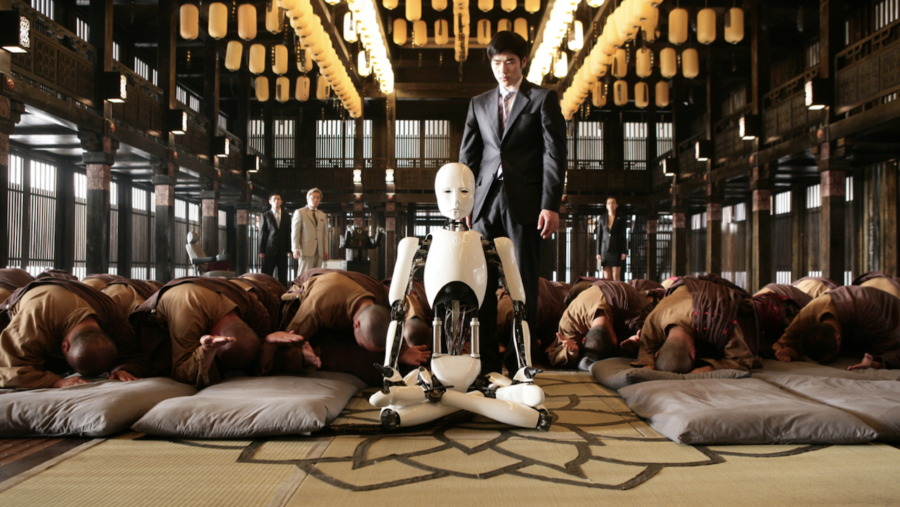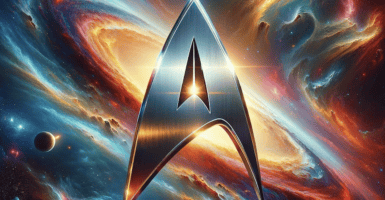Doomsday Book Movie Review
Buddhist 'bots and giant eight-balls.

We are back with a satirical three-sided dropkick to the human condition in the form of Doomsday Book, a 2012 anthology film from South Korean directors Kim Ji-woon and Yim Pil-sung. While this isn’t our first foreign film and definitely won’t be our last, I might have to take some kind of an anti-depressant before the next one.
In Doomsday Book, the three stories told are absurdist cautionary tales. They contain some stunning imagery, nifty special effects, cerebral subtext, and black-as-coal humor, sometimes all within the same scene. Each segment is related to the others in tone and purpose, but the starkly different subject matter makes speaking about the film as a whole more difficult. So let’s look at each part separately.
Doomsday Book‘s Brave New World
In lesser hands, this first Doomsday Book entry would be a zombie tale, first and foremost, with food industry satire buried in the rubble, but that is not the case here. A young research scientist Seok-woo (Ryu Seung-beom) is left to watch over the house while his family goes on vacation.
While cleaning up- in what has to be the most disgusting household lived in by an otherwise normal family- he comes across an apple that’s gone dark gray with rot. We get to watch that apple’s nauseating journey where it accidentally gets manufactured into a shipment of cow feed. The tainted meat enters the restaurant world, and people are turned into violent, mostly mindless monsters. It’s pretty bizarre stuff, and there are mild Biblical parallels referenced.
“Meat and the Bible. These two things represent food for the body and the soul.”
The actual outbreak in Doomsday Book gets its share of screentime, but the focus of the segment is on both the infected Seok-woo and his equally infected girlfriend, as well as the lunacy of the TV news organizations covering the story, something that comes back in the third story.
These anchors and panelists are out there, and it’s unclear exactly where satire crosses the line into surrealism, especially when the family gets back from vacation. An often funny and wickedly twisted romp, the first third of Doomsday Book gets most of the wacky violence out of the way before the more introspective stories that follow.
Doomsday Book’s Heavenly Creature
Seemingly out-of-place because of its subdued mood, this second Doomsday Book story offers a realistic take on what would happen if a robot could become something more than the sum of its parts, especially in a world where an abundance of human-robot companionships have drastically reduced the birth rate.
A technician is called to a Buddhist monastery to check on an RU4 robot that may have possibly reached enlightenment, speaking in phrases that could easily fill desk calendars. “Perception itself is void, as is the process of perceiving.”
Because the bot isn’t technically malfunctioning, the tech doesn’t report it, but the manufacturers soon show up at the temple, aiming to exterminate this RU4 model, along all the rest in the world.
This segment just presents both sides of the artificial intelligence argument, and ties it all together with religious practices. I’m not one who usually falls into films with religion as the guiding focus, but when the narrative context is as rich as it is within these smaller stories, I can easily embrace it. I kind of need an RU4 in my life. He’s damned near the best actor in the movie.
Doomsday Book’s Happy Birthday
This Doomsday Book segment pushed all boundaries as far as its central conflict is concerned. A young girl named Min-sea (Jin Ji-hee) accidentally breaks her pool-fanatic father’s eight-ball, and she tries ordering another one online for a low price, only to put the entire planet at risk due to an accidental wormhole opening up.
Two years later, a gigantic asteroid is headed for a crash course with Earth, and everyone goes into countdown mode. The central family moves into an underground shelter, where exercise equipment must be used to power up the electric generators.
The tone shifts rapidly between the depressing fate of this family and the equally depressing but far more hilarious fate of the news channel reporting on the asteroid. (There’s also a Home Shopping Network equivalent that is seen selling personal shelter pods, and they’re selling like hotcakes!)
Things get even stranger in Doomsday Book once they realize the asteroid is actually an enormous, cracked eight-ball, essentially the one that Min-seo broke to begin with. Watching this young girl realize that she is responsible for the oncoming disaster is a sad thing to witness, but the weirdness of it all levels those emotions out right quickly. It helps that the family dynamic is so dysfunctional to begin with.
While the complete film isn’t nearly as coherent as I’d like it to be, that’s the only real complaint here. Doomsday Book is a movie full of ideas and off-kilter commentary on those ideas. I couldn’t tell you what the best time to watch a movie like this is, but it’s probably best to have a friend around to share wide-eyed glances with.
See Doomsday Book if you like: movies that the majority of American audiences would be scared of; second-guessing your stance on robots that don’t obey; interstellar delivery services; any of The Onion’s live series.











